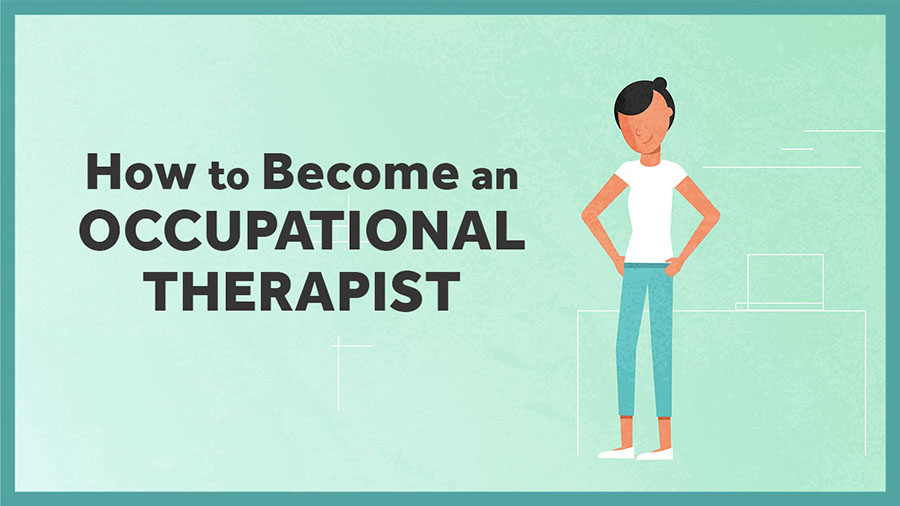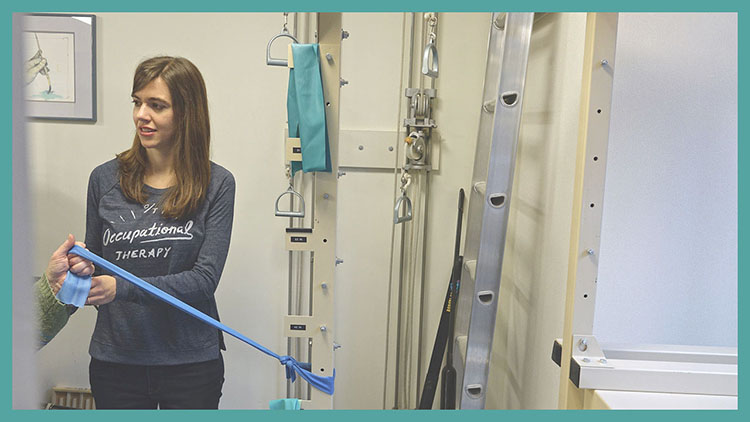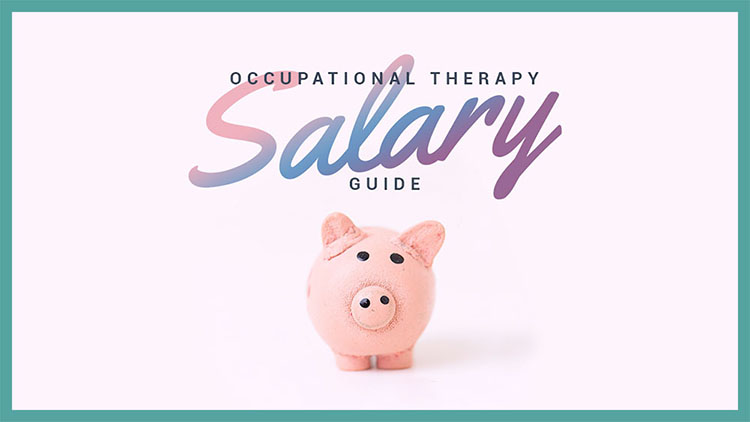how long does it take to become an occupational therapist

Do you enjoy helping others to improve their lives—especially when they struggle with health challenges? Do you love science and working with people? Are you a creative, holistic thinker who feels best when helping others live their best lives?
If so, a career as an occupational therapist (OT) could be the right choice for you!
In this article, we will cover the following to help you decide if occupational therapy might be the career for you:
- What is occupational therapy?
- What, exactly, do occupational therapists do?
- What skills would an OT need?
- Should you become an occupational therapist?
- What level of education do you need to become an OT?
- What is the best undergraduate major for OT School?
- Top occupational therapy schools
- How to pick an occupational therapy school?
- Are occupational therapists in high demand?
- How much money does an occupational therapist make?
- 5 basic steps to becoming an occupational therapist
- Map out a plan and follow it
What is occupational therapy?

Occupational therapy (OT) is a form of rehabilitation that helps people with health challenges re-engage in meaningful daily activities. Occupational therapists (OTs) focus on education, functional training, and participation in everyday activities, rather than relying on pharmaceuticals or surgical interventions.
Occupational therapists (OTs) are considered allied health professionals, and they work alongside physicians, nurses, physical therapists, speech therapists, respiratory therapists, and many other health practitioners. OTs collaborate with fellow health providers to deliver holistic care to patients who have suffered from debilitating illnesses or injuries.OTs are unique in that they use evidence-based interventions to help patients participate in the activities they find most meaningful. That means care is extremely holistic and tailored to each individual patient. And, while other rehabilitation professionals are also trained in helping patients regain function, we OTs are unique because we also address cognition and mental health—in essence, we truly take a mind-body approach in our care delivery.
If you are looking for a basic walk-through of OT, I highly recommend checking out our guide: What is OT?
If you are curious about the similarities, differences, and interdisciplinary opportunities within the standard rehabilitation team, check out our guide: OT vs. PT vs. SLP: Similarities and Differences.
What, exactly, do occupational therapists do?

If you're considering a career in OT, it's very important that you truly, completely familiarize yourself with occupational therapists' work. This is a critical step before you decide to invest the time, money and energy needed to enter the profession.
(I also recommend that you do plenty of informational interviews with OTs, and shadow them whenever possible before you begin pursuing this career path.)
Occupational therapists generally work with patients who have sustained effects of debilitating diseases and injuries.
OTs help patients determine which types of life activities are most meaningful to them. Then they work with said patients, family members, and caregivers to develop strategies to help the patients participate in such activities. These can range from anything like cooking or participating in the community garden club, to bathing and dressing independently.
We believe that returning to normal daily activities not only aids in the healing process, but is also the true, overarching goal of rehabilitation.
An OT's day is usually spent working with a series of patients on a set schedule. OTs evaluate and assess patients' needs, then set plans of care (POCs) consisting of discrete goals for functional recovery. Much of an OT's job involves troubleshooting patients' challenges and determining the right types of interventions to address the problems.
The types of interventions and care plans that an OT selects will be tailored to a patient's unique needs—but patients' needs span a wide spectrum, and there are many types of treatment approaches and settings OTs can choose from.
Here are a few of the most common settings in which occupational therapists work:
- Hospitals and inpatient rehabilitation facilities
- Skilled nursing facilities (sometimes called nursing or convalescent homes)
- Schools
- Patients' homes
- Privately owned clinics
It's worth noting that OTs spend quite a bit of their time filling out paperwork, too. Each patient's case must be documented, and the documentation rules and frameworks can be very involved. That means that occupational therapists realistically spend a significant portion of their days writing notes about cases and communicating with other members of the care team.
What skills would an OT need?

Occupational therapists blend science with a healthy dose of compassion. OTs need to be somewhat analytical, but also patient and encouraging. They should enjoy science (especially anatomy and kinesiology) and enjoy working with the general public. OTs need to be excellent listeners and problem-solvers, and also need to understand how to effectively teach others.
Much of what an OT does involves educating patients, family members, and caregivers—so it's vital that OTs understand how to effectively communicate and educate.
OTs also need to be very safety-oriented. One of the biggest issues that fieldwork coordinators (the ones providing real-life clinical experiences to OT students) face is students' lack of safety awareness. Much of an OT's job surrounds keeping patients and family members safe, which can be a challenge. From teaching family members how to safely assist with bathing and toileting, to demonstrating safe use of medical equipment—a huge focus in OT is teaching safety awareness.
Lastly, a good OT should be able to work collaboratively with others on a multidisciplinary team. Much of an OT's work involves providing holistic perspective on what a patient truly wants out of the recovery process—thus, being able to effectively communicate patients' and family members' needs and goals to a number of medical providers is essential.
Should you become an occupational therapist (OT)?

This is the million-dollar question, isn't it? OT is incredibly fulfilling work, but there are some important factors to consider when you choose a profession that puts others' needs first.
You'll want to consider the cost of education and training, the physical and emotional demands of the job, whether you enjoy being around people all day/every day, and how well you cope with working with an injured and/or ill population.
Potential pros of being an OT
Career advancement
If you become an OT, you will have opportunities for advancement in your career. You can become a clinic owner, or you can opt to specialize and remain an employee. You can also pursue a number of different non-clinical (or alternative) OT careers. While there is certainly growing market saturation in desirable cities, it's still very possible to make a good living as an occupational therapist, especially in small cities and rural locales.
The other benefit of having a wide scope of practice is that there are many settings you can work in, and many people change settings through their careers when they're ready for a change of pace. For example, it is common to work in more demanding settings, such as SNFs and acute care, right out of school. However, once their debt is paid off, some therapists find themselves transitioning to pediatrics, outpatient, or mental health settings.
Fulfillment
As I noted, OT is very fulfilling. You are working with patients when they are at their most vulnerable, and you are teaching many of them skills so they can participate in a life they feel is worth living. That is priceless, and many OTs form long-lasting relationships with patients and their families.
I always think it is worth noting that OT is a popular second career. Many seasoned professionals are attracted to the meaningful nature of the work we do.
Stability
Another nice thing about occupational therapy is that it's fairly easy to find OT jobs wherever you go. Yes, you might need to get licensed in a new state, and yes, you might take a pay cut if you move to a saturated market, but it's rare to simply have no luck at all landing an OT job.
Flexibility
Occupational therapists also enjoy a decent amount of flexibility in their work. Many jobs require you to be full-time or quit altogether, but OTs are often allowed to go part-time or PRN when they need more flexibility in their jobs. Keep in mind that this might impact pay and benefits, though!
Potential cons of being an OT
Stress
If you're wondering how stressful it is to be an OT, it really depends. There are certain settings where OTs are required to be very efficient with their time (some might argue that taking pee breaks is a challenge in these environments!), which can lead to higher-than-average job stress. However, there are other environments where you can set your own schedule, which often helps with stress management.
Increasing productivity demands
Keep in mind that occupational therapists have increasing amounts of documentation and frustrations with reimbursements, like almost all of our fellow healthcare practitioners. Yet, we're still expected to see the same number of patients per day with these additional non-billable tasks piling up. This has led many OTs to work long hours, decreasing their overall pay. For this reason, some OTs are starting to create specialized cash-based OT practices. These practices can be challenging to operate, though, as patients will need to be convinced that you'll deliver adequate value compared to insurance-based practices.
Physical and emotional demands
Occupational therapy can be a heartwarming job, but it is often very physically and emotionally demanding. For this reason, many OTs experience burnout at some point in their careers. However, OT is such a diverse profession that it is relatively easy to switch settings or work in non-clinical OT jobs like utilization reviewer, clinical liaison, OT faculty member, health content writer, or director of rehabilitation.
Debt
Unfortunately, becoming an occupational therapist is not cheap. Occupational therapists now must attend a master's degree program, on top of any expenses associated with undergraduate education. While debt can certainly be managed through frugal living and wise school selection, many OTs do find themselves in quite a bit of debt upon graduation. This can add to existing stress related to the job itself.
The good news is that, unlike physical therapists, you're not required to get a doctorate degree in order to apply for licensure. If you're concerned about debt load, one option is to become an occupational therapy assistant (OTA), which only requires an associate's degree.
What level of education do you need to become an OT?

As I noted in the previous section, occupational therapists are highly educated.
While some OTs are grandfathered in from the days when a bachelor's degree was standard, a master's degree is now required as entry-level OT education. In many schools, a doctorate (OTD) is being offered. As I mentioned, though, the OTD is not required at this time.
How long do you have to go to school to learn how to become an occupational therapist?
I'll be straight with you. A long time!
In most cases, you'll need to complete an undergraduate degree (four years, unless you graduate early or pursue an accelerated program), and then you'll be in occupational therapy school anywhere from two to three years.
During that time, you'll also go on fieldwork assignments, where you'll be working as an occupational therapy student (OTS) under the supervision of a licensed OT.
One thing to keep in mind is that each state in the US has its own rules and regulations for practicing as an OT. You need to get an OT license for any state in which you want to practice, and each state does have its own unique requirements for initial licensure, and also for license renewal.
Lifelong learning is a one of the major tenets of the OT profession. Many OTs choose to join journal clubs like the OT Potential Club, which provides weekly breakdowns of research relevant to OT clinical practice.
What is the best undergraduate major for OT school?
If you are seriously considering occupational therapy, you will want to take OT school prerequisites into account. I would start by looking up various OT schools to see exactly what their prereqs are.
For example, to get into the program I attended at NYU, I needed to take the following courses before starting the program:
- Developmental Psychology (this course should cover the lifespan).
- Abnormal Psychology (this course should cover the lifespan).
- Behavioral Sciences (one additional social science course).
- Human Anatomy and Physiology I and II (with labs).
- Elementary Statistics
It's worth noting that my science prerequisites needed to have been completed within the previous ten years, and NYU would not accept online (or even hybrid) science prerequisites.
As you can see, these courses may lend themselves to starting with a psychology or science major as an undergraduate. That being said, I always encourage people to pursue whatever undergrad major is interesting to them.
There is a good chance you can get all of these prereqs in, but still major in something that is completely different. For example, I was a religion major in college. For me, this was the perfect preparation, because it helped me get a high-level perspective on how humans experience meaning and craft their lives accordingly. And, a key to occupational therapy is understanding how people do this on a personal level, so we can help them participate in the lives that are most meaningful to them.
Top occupational therapy schools
There are tons of different occupational therapy schools across the US. While some are considered better than others (in terms of how selective they are, the accolades of their staff, etc.), I recommend that you take rankings with a giant slab of salt. That's because there's no evidence that graduating from a highly ranked school yields any better job opportunities or pay upon graduation. Instead, an impressive OT resume and fieldwork assignments are more likely to help you stand out as a new grad OT candidate.
If you're still focused on the idea of attending a "top" OT school, here are the top 12, according to US News and World Report:
1. Tie: Boston University, Washington University in St. Louis
3. University of Southern California
4. Tie: University of Illinois-Chicago, University of Pittsburgh
6. Tie: Colorado State University, Thomas Jefferson University, Tufts University
9. Tie: University of Kansas Medical Center, University of North Carolina at Chapel Hill
11. Columbia University
12. Tie: New York University, Ohio State University
How to pick an occupational therapy school?
I recommend that you explore the mission and philosophy of each occupational therapy school. Dig deep to find out what the program values, in terms of its curriculum and vision for OT.
I found it really helpful to read the biographies of faculty members on each school's website. This gives you a sense of who they are and which types of research interests them. If you can find a program where the professors' interests align with your own, that is ideal!
Other factors to consider include:
- Whether the program offers a master's degree or a doctorate degree
- The location (including the cost of living)
- The price
- The quality and breadth of fieldwork opportunities
- The NBCOT pass rates
- Class sizes
- Program completion rate
- Job placement assistance
- The facility and equipment
I strongly recommend that you really examine the cost of the program you'd like to attend. That's because, as noted above, there really isn't a correlation between a school's reputation and what you'll get paid when you graduate—plus, you'll enjoy your role as an OT way more if you're not constantly stressing out about repaying your student loans.
Are occupational therapists in high demand?
According to the Bureau of Labor Statistics (BLS), occupational therapy jobs are on the rise, with employment of OTs projected to grow 24% between 2016 and 2026. This rate is much faster than the average projected growth of professions in the US.
That said, there are certain cities where the OT market is more saturated than others. In large cities and locations with occupational therapy schools, demand for OTs generally won't be as high as it is in rural areas.
How much money does an occupational therapist make?

When you're considering a career as an occupational therapist, you're probably weighing your earning potential. There are numerous factors that impact your salary as an OT. Years of experience, specialization, location of practice, and setting all affect your compensation. Also, some employers pay hourly rates, while others pay salaries.
We did a TON of research, and created the most comprehensive article about OT salaries around! Based on our research of numerous websites—and our own calculations—we found a national average of $76,448/year. You can see that OTs do pretty well financially, but what those numbers don't show is that occupational therapists do have a pretty poor debt-to-income ratio.
Also, since so much of OTs' salaries hinges on insurance reimbursement rates, many therapists are disappointed to find that they work hard, but don't always reap the rewards in terms of raises or bonuses.
5 basic steps to becoming an occupational therapist
We discussed a lot of nuance and detail about becoming an occupational therapist in this article, but we wanted to conclude by breaking the process down into 5 basic steps, so you have a concrete idea of the basic roadmap to pursuing this career.
Step 1.) Earn a bachelor's degree
The first step of becoming an occupational therapist is completing necessary requirements to become accepted into OT school. That means earning both a high school degree and an undergraduate degree with the proper prerequisite coursework.
Step 2.) Complete observation hours and (probably) the GRE
While you are working on your undergraduate degree, you'll need to start getting your volunteer/observation hours for occupational therapy school. Each program has its own requirements, but you'll generally want to work in at least a few different settings, and it's also wise to explore different types of patient populations. For example, you might want to work in a pediatric OT clinic, a school-based OT clinic, a skilled nursing facility (SNF), and an inpatient rehab facility. You might also want to do some observation hours in an acute care facility (hospital). In any case, you're generally not paid for observation hours unless you work as a rehab aide or tech.
You will likely need to take the GRE (graduate record examination) and get a decent score, along with earning somewhat high marks in your undergrad program. Please check with the individual programs you are interested in to see if the GRE is required.
Step 3.) Decide between an MOT and DOT and get into a program
Another decision you'll need to make is whether to pursue your master's degree or a doctorate degree. There are pros and cons for each.
In most scenarios you will be competing for the same clinical jobs (and level of pay) whether you have a masters or doctorate, so if you are looking at the two options from a purely numbers standpoint, it probably makes sense to take on less debt and go for the master's degree.
That being said, a doctorate might open doors for you down the road, especially if you want to work in academia or research.
Step 4.) Pass the NBCOT
Once you complete your occupational therapy degree, you'll need to pass the national board exam (NBCOT).
Step 5.) Obtain licensure in your state
You'll also need to apply for licensure in the state(s) in which you seek to practice.
You will then need to take continuing education courses throughout your career to keep your license active. (This is the case in nearly all states, though there are a few exceptions.)
Conclusion: Map out a plan and follow it
Becoming an occupational therapist is hard work, but it's worth it. I recommend that you start planning as early as possible. If you start really focusing on good grades, high GRE scores, and impressive volunteer work, you'll have a better chance at being accepted to the school(s) of your choice.
Be sure to continue exploring the trends in the OT field as you pursue your dream. There are always new developments and creative ways to use your education, and the earlier you start thinking about your goals within the OT realm, the sooner you can take advantage of everything your OT school has to offer.
Best of luck, and can't wait to see you in our wonderful profession!
how long does it take to become an occupational therapist
Source: https://otpotential.com/blog/become-an-occupational-therapist
Posted by: hurstaffing1947.blogspot.com

0 Response to "how long does it take to become an occupational therapist"
Post a Comment